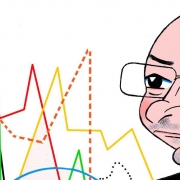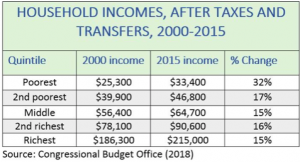Nozick Explains Why so Many Intellectuals Are Opposed to Capitalism
Intellectuals these days seem almost inherently opposed to capitalism. And while we may view this negative perception as a relatively new phenomenon, the intellectual revolt against the free market is really nothing new.
In 1998, the brilliant philosopher and author Robert Nozick wrote an essay entitled, Why Do Intellectuals Oppose Capitalism? In his essay, he attempts to explain why it is that intellectuals, even right-leaning intellectuals, tend to resent the free market system. And the answer might surprise many, as his argument rests heavily on our education system.
The Wordsmiths
Before Nozick can dive in and properly explain why so many intellectuals stand in opposition to capitalism, he must first define what he means when he uses the term “intellectual.” Intellectuals and academics come in many different forms, but when Nozick speaks of them, he is referring to one particular group of people.
He writes:
“By intellectuals, I do not mean all people of intelligence or of a certain level of education, but those who, in their vocation, deal with ideas as expressed in words, shaping the word flow others receive. These wordsmiths include poets, novelists, literary critics, newspaper and magazine journalists, and many professors.”
He continues:
“The opposition of wordsmith intellectuals to capitalism is a fact of social significance. They shape our ideas and images of society; they state the policy alternatives bureaucracies consider. From treatises to slogans, they give us the sentences to express ourselves. Their opposition matters, especially in a society that depends increasingly upon the explicit formulation and dissemination of information.”
The wordsmiths, as Nozick calls them, are used to being held in high esteem in society. Since they hold the keys to communication and expression, they have been looked up to and revered by society and have become accustomed to recognizing and admiring their own importance. Of course, wordsmiths are not the only form of intellectual out there. They are, however, the group most commonly opposed to capitalism.
Nozick highlights how these intellectual “wordsmiths” are different than their “numbersmith” counterparts.
“Why do the numbersmiths not develop the same attitudes as these wordsmiths? I conjecture that these quantitatively bright children, although they get good grades on the relevant examinations, do not receive the same face-to-face attention and approval from the teachers as do the verbally bright children.”
When you are dealing with a field as black and white as math, you are either right or you are wrong. But when it comes to communication, the victor is not always the individual with the soundest logic. Instead, to he who can construct the most poetic sentences or appeal to the strongest emotions goes the spoils. And many wordsmiths are used to being praised for the construct of their words, rather than the content of their ideas.
Unfortunately, our education system has reinforced the belief that being a wordsmith guarantees your value in society. And unfortunately for the intellectuals, the market does operate in this manner. To succeed in the market you must create real value for people that goes beyond your intellect. And this is something that irks the academic class.
Nozick points out:
“Intellectuals now expect to be the most highly valued people in a society, those with the most prestige and power, those with the greatest rewards. Intellectuals feel entitled to this. But, by and large, a capitalist society does not honor its intellectuals.”
Schools, Intellectuals, and Central Planning
Many intellectuals foolishly believe that their intellect has bestowed upon them an inherent value and merit that all should recognize. And in a centrally planned society, this may be true. But in a capitalist system, this is not how we operate. As Nozick says, “The wider market society, however, taught a different lesson. There the greatest rewards did not go to the verbally brightest. There the intellectual skills were not most highly valued.”
Nozick writes:
“But a capitalist society does not satisfy the principle of distribution ‘to each according to his merit or value.’ Apart from the gifts, inheritances, and gambling winnings that occur in a free society, the market distributes to those who satisfy the perceived market-expressed demands of others, and how much it so distributes depends on how much is demanded and how great the alternative supply is.”
Meeting market demand has very little to do with intellect. You do not need a degree or years of schooling to be successful in the free market, and this on its own is enough to disenchant the wordsmiths. In the market, everyone has equal access to success so long as they are willing to work for it and have an idea or product that is wanted by others.
Unfortunately, our schooling system has not taught this principle well. In the classroom, the intellectual is praised and held up as a standard of excellence by the instructors. In this centrally planned environment, the intellectual thrives and builds on his or her feeling of intellectual superiority. But on the playground or in the halls, where, like the market, spontaneous order is everpresent, the wordsmith find himself out of place and unable to control their circumstances with their intellect.
As Nozick writes:
“For distribution in a centrally planned socialist society stands to distribution in a capitalist society as distribution by the teacher stands to distribution by the schoolyard and hallway.”
He continues:
“It is not surprising that those successful by the norms of a school system should resent a society, adhering to different norms, which does not grant them the same success.”
The market doesn’t care how smart you are. It doesn’t care where you went to school or how often you were praised by your teachers and professors. Instead, the market rewards individuals based on their ability to serve consumers and meet demand.
Nozick says:
“Despite the created expectation, a capitalist society rewards people only insofar as they serve the market-expressed desires of others; it rewards in accordance with economic contribution, not in accordance with personal value.”
He later continues:
“Capitalist societies reward individual accomplishment or announce they do, and so they leave the intellectual, who considers himself most accomplished, particularly bitter.”
In short, many intellectuals, both right and left, despise capitalism because it does not play by their arbitrary rules. An “A” on a test will get you praise from a teacher, but it will not put bread on your table or make you successful in the broader world. But since so many in the academic world have instilled in students this belief that they are superior to others, it is no surprise that many lose themselves in bitterness as they see those who are intellectually beneath them achieve higher levels of success.
Nozick hits the nail on the head when he writes:
“The intellectual wants the whole society to be a school writ large, to be like the environment where he did so well and was so well appreciated.”


















